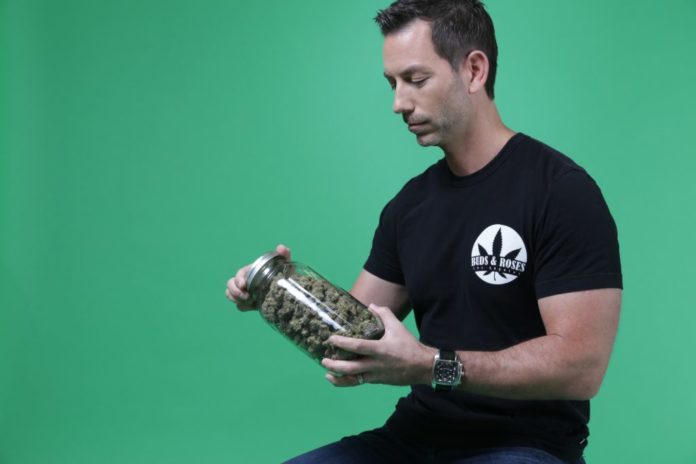Aaron Justis is a tireless and ubiquitous proponent of rational regulations and an optimistic sea of calm in an industry with a wild-child reputation.
It’s not much of an exaggeration to say everyone has heard of Buds & Roses, the high-end medical marijuana dispensary that’s become a fixture of sorts on Ventura Boulevard in upscale Studio City, California, and whose president, Aaron Justis, is well-known not just within the cannabis industry, but also among politicians in cities from Los Angeles to Sacramento and beyond. As far as his very presence in the industry goes, the 39-year-old entrepreneur, activist, husband, and father of two seems to be everywhere. He sits on the Studio City Medical Marijuana Advisory Board and the steering committee of the Greater Los Angeles Collective Alliance (GLACA), serves as a board member for both the National Cannabis Industry Association (NCIA) and the California Growers Association, and recently helped found a group called the Cultivators Alliance. And that’s just the short list. He also can be found at just about every industry event, bringing a consistently serious and thoughtful intelligence to bear on the most significant issues of the day. All of this is in addition to his day job as a brick-and-mortar retailer overseeing the day-to-day operations of Buds & Roses, which he began operating about six years ago after moving his family to California from Illinois, in short order taking the non-profit collective from annual revenues in the tens of thousands to reportedly more than $3 million in 2015.
How Justis does it all is anyone’s guess, but after speaking with him it soon becomes apparent his commitment is genuine, and he brings a special aptitude to his duties. Not least among his gifts is a sense of balance and perspective, qualities that serve him well running a cannabis business and also set him apart. At industry events that often feature larger-than-life characters, his calm demeanor paints him as a different breed of cat. He can seem cold at times, too intellectual in a world of boisterous outlaws and miscreants, but in fact he is warm in person, engaging and eager to find a human connection that puts his guest at ease, even when the subject veers into something uncomfortable, like running what some consider a criminal enterprise.
He answered a question about the state of business with impressive candor. “The current environment is very unstable. We’re actually illegal, just like every dispensary in the city, but if we can prove it in court, we have limited immunity from prosecution. Because we’re all illegal, the city can’t pick and choose and go after non-probity collectives. We’re basically all banned, and if they get community complaints, neighborhood complaints, they can raid us and cause us problems, and then it’s up to us to prove that we qualify under limited immunity.”
The twenty-year veteran of cannabis activism sounded as though he were explaining why he had been all but coerced into his current role of uber-activist like Casablanca’s Rick Blaine was forced to fight the Nazis. Justis doesn’t want to fight; he’d rather be a lover, but his sense of fair play won’t allow him to back down in the face of inequity.
“My whole thing is that I have a major problem with the war on drugs,” he said. “The city I’m from, Rockford, Illinois, often ranked the second or third most dangerous city in America, and I grew up seeing a lot of problems that happened because of the war on drugs, mainly to minorities.
“I got here in the middle of 2010,” he continued, “and in 2011 and 2012, I was still investing my life savings in the business and working for free. For both years I worked for $25,000, hoping that one day I would get reimbursed for my time and the money I invested moving my family across the country. The previous year, when I took over Buds & Roses, their total sales were $40,000. I quickly bumped that up, but besides working for free and a few thousand dollars, we built this from zero. No loans, just reinvesting in more product—door handles, flooring, a printer—slowly building it from the ground up. It was me and Tyler, my best friend from when I was eleven, who is now my brother-in-law. Once we got the dispensary, we didn’t want to build this big company; we wanted to just get a license. Five or six years later, that’s still the plan.”
Challenges inherent to collective life in L.A. created ongoing obstacles, like being at the constant mercy of the police. “In Los Angeles, it’s the [L.A. police department] that made the regulations, because if they want to bust you for concentrates one week, they bust you,” said Justis. “They even came after us for the Sherman Act a couple of years ago, for not labeling properly. And we were like, wait a minute, that doesn’t even fly. It doesn’t mention cannabis in the law, but they would still raid dispensaries over that.”
His solution was to self-regulate. “Because the supply-side is unregulated, we created a rule whereby you had to be a patient for 90 days before we would take your product, or even look at it. There is a way to bypass that—I can make the decision—but those who usually bypass it are manufacturers of quality products that are pre-packaged and have done all the things with their labeling that we demand even though there are no regulations that require special labeling. So those are two ways that we self-regulate: the 90-day policy and labeling.”
He said the collective is also diligent about paying taxes, which has created good will with city halls and tax collectors, but there is a downside. “We pay six percent gross sales tax and workers compensation, and it is hard to survive when 90 percent of the competition does not. When you are in this industry legitimately you have to pay these taxes, but it’s almost impossible to stay in business. The sales tax alone is destroying us. We also pay a 9.75-percent sales tax and then collect that to pay the state. A lot of places collect [tax] and then don’t pay the state.”
And then there was the audit. “We were audited by the IRS in early 2014 for 2011 and 2012, and it just ended about six months ago,” he said. “So we have no money from that time; everything went to legitimate expenses like paying employees, paying the rent, growing the business a little bit, and just trying to stay around. When the IRS audited us, they wouldn’t accept any expenses. We had to pay $220,000 in taxes, and we’ve never had $220,000.
“It’s robbery, straight up,” he added. “I’ve been robbed at gunpoint, and it was much nicer than what the IRS did to me, and [the robbers] didn’t get anything like what the IRS got. So now we have the next couple of years where we have a better strategy, but we’re still paying a similar amount. Maybe we have greater sales and we have better cost of goods, but at the end of the day I’m spending hundreds of thousands of dollars for absolutely nothing, and this is not the kind of business that has hundreds of thousands of dollars to spend on absolutely nothing. We’ll continue to drag this out but something has to change, which is why I am active with NCIA, because 280E and banking are two of the big issues with NCIA.” 280E is the federal tax code that prevents cannabis businesses from deducting legitimate business expenses from their taxes.
Despite these onerous challenges, Justis is adamantly optimistic about the future. He said the state is on the right path. “I believe this is a friendly environment in the sense that we do not have residency requirements right now and we may not get them,” he said. “But California is not one big state where you can apply in one day like in other states. It’s all about the different localities, and it will take someone who lives there, works there, and plays there to connect and create a license structure in each locality. And that’s a small business-friendly model.”
His adamant support for small business is also why he supports the mission of the California Growers Association, which lobbied hard in support of the new Medical Marijuana Regulation and Safety Act. “What they fought for was the small businessperson, and what we have in California is a system in which thousands of cultivators could have the possibility of getting a license,” Justis said. “Maybe there are 50,000 growers in the state. We could legitimize tens of thousands of those, and I would be happy to legitimize 5,000 in the city of Los Angeles alone.”
That confidence extends tenfold to Buds & Roses, which he said produces a product of such superior quality that he is unconcerned about the Wild West environment that plagues Los Angeles collectives via 2013’s Proposition D, which capped medical marijuana dispensaries and raised taxes.. “We’re not scared of competition, and we don’t think that even if the city approved 150 dispensaries there would ever be that few. There are many hundreds that operate outside of any regulations. The city is just not eager to do anything, so Prop D is basically a starting point. But at the end of the day, if there were 300 or 500 licensed dispensaries in Los Angeles I could care less, because there are 1,500 now.”
As far as the ballot initiatives being considered for 2016, Justis takes a long view. No matter what happens, he said, “I feel like I am going to be working the cannabis process regulation for years to come. It’s not going to end anytime soon.”
For Justis, the business is all about the quality of his bud, of which he proudly states, “I don’t think there is another flower producer in the world right now that is more trusted than us, because people just know that we have the best. Andrew DeAngelo [the brother of Harborside’s Steve DeAngelo] told me that any dispensary would be beyond thrilled to have our product in their store, which feels great coming from the number one retailer in the country.”

He added, “Now our flowers are still veganic, but we are advancing our cultivation techniques, and doing a ton of research and development. There is much more to our methods than the nutrients, and we need to continue the scientific research we’re doing now for the health of the plants. Our quality has a lot to do with the strains we select the way we cure, store, and handle the product, and the way we braid it. It explains our success and why we’re continuing to focus on the highest-quality products we can produce, starting with the flower itself.”

“The other thing,” he added, “is that I simply believe cannabis reduces so many harms.”
The Illinois native andglobetrotting cannabis advocate still finds Southern California the epitome of his dreams. “Here’s what it is: When there’s blood in the streets, that’s when you buy, and Southern California is very bloody,” he said. “It is the marketplace. Even though there are only maybe twenty real licenses in Southern California, as they come online I hope to get some of them and expand throughout the area. There are so many cities, and I love it here. It’s beautiful. This is like heaven on earth. I need to have relationships throughout Southern California and I’ve been building those, and you will see that, similar to Harborside, we willalso expand from one dispensary to three or four.”
 Like any true entrepreneur, Justis’s vision is even more ambitious. “Retailers are on the front lines, plain and simple, and I’m making change, not following change,” he said. “I could see myself opening ten stores a day, similar to [Starbucks chairman and CEO] Howard Schultz, but we’re talking ten years in the future.”
Like any true entrepreneur, Justis’s vision is even more ambitious. “Retailers are on the front lines, plain and simple, and I’m making change, not following change,” he said. “I could see myself opening ten stores a day, similar to [Starbucks chairman and CEO] Howard Schultz, but we’re talking ten years in the future.”











